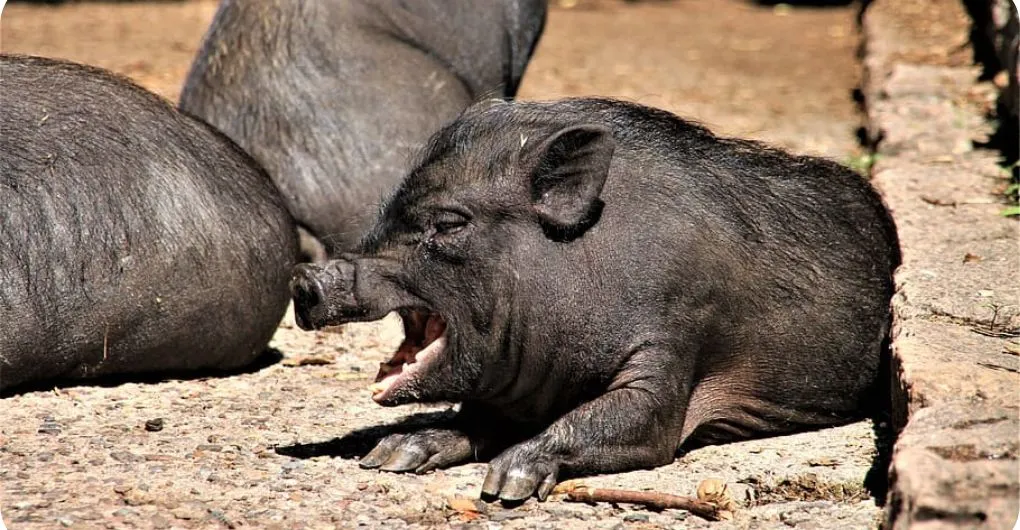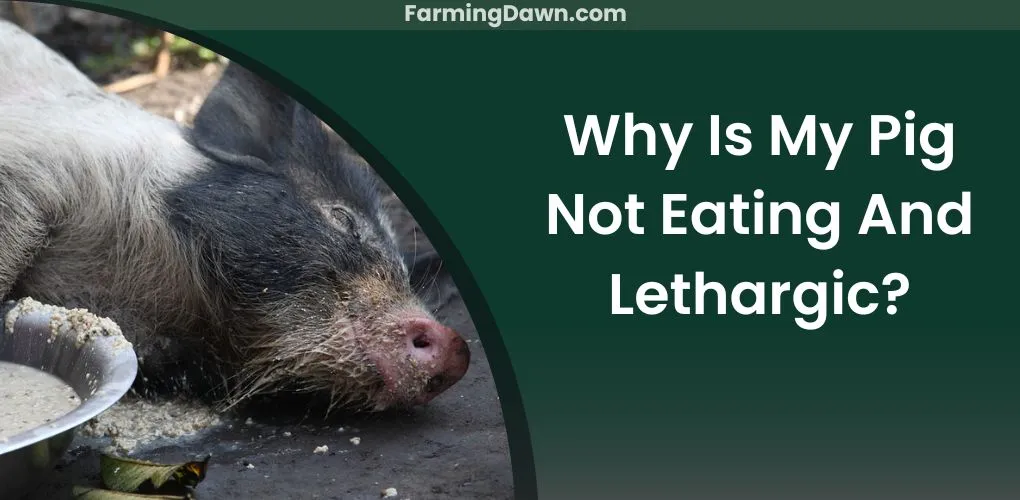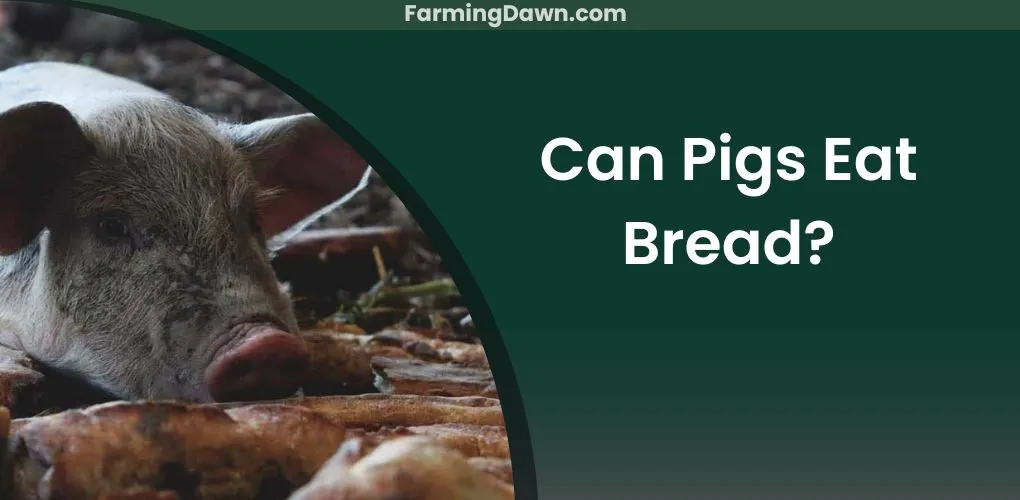When it comes to pigs not eating and showing signs of lethargy, vomiting, and diarrhea, it can be a worrying time for any farmer. I understand that these issues can cause many sleepless nights as you worry about the health of your pigs. In this post, I want to help you better understand why this may happen with your pigs, so you have more peace of mind.
My team and I have spent years working with pigs in all kinds of conditions, from good to bad, so we know what works best when caring for our swine friends. Through experience and research, we are confident that our advice will help ensure your pigs stay healthy and happy if followed correctly!
Causes Of Pig Not Eating And Lethargic
Did you know that, on average, pigs can consume up to 4.5% of their body weight in feed each day? That’s a lot! But when a pig isn’t eating normally and is lethargic, this could be due to several causes.
Pig lethargy can be caused by an imbalance in the animal’s electrolyte levels or dehydration from diarrhea. It might also result from an infection, such as:
- Swine dysentery.
- Salmonellosis.
These infections can cause vomiting and loose stools with mucus and blood.
Another common cause of pigs not eating correctly and being lethargic is poor nutrition – either from inadequate feed quality or because the animal has trouble digesting what they are given. If this is the case, changing the food type being fed may help improve their health. Also, providing additional vitamins and minerals in supplements may be beneficial too.
How To Treat A Lethargic Pig
Treating a lazy pig can be complex. But, with the help of your vet and some natural remedies, you can give your pet a better quality of life.
Here are three simple steps to take when treating a lethargic pig:
- Make sure it has access to clean water at all times. This will help replenish fluids lost during vomiting or diarrhea episodes.
- Provide a balanced diet rich in proteins, vitamins, and minerals. Including bananas in a pig’s diet can help provide potassium and other minerals. You may also want to feed small amounts throughout the day instead of one large meal since this is easier for the digestive system to process.
- Keep its living space comfortable by providing adequate bedding and avoiding extreme temperatures. Also, ensure that there are no drafts or dampness which could make the animal’s condition worse.
These simple measures should go a long way towards helping your pig regain its energy and appetite over time, but if any symptoms persist or worsen, then contact your veterinarian right away, as they will have more specialized advice on how best to treat your pet’s particular situation.
Causes Of Pig Not Eating And Vomiting
It’s heartbreaking when an animal is sick, and you can see it in its eyes. Below, I have listed 4 causes of your pig not eating and vomiting:
- illness: Pigs can become ill from a variety of causes, including infections, parasites, and other diseases. If your pig is not eating and is vomiting, it could be caused by an underlying illness.
- Stress: Stress can cause pigs to stop eating and even vomit. If your pig has recently been moved to a new home, exposed to a new animal or person, or is not getting enough time out of its pen, it could be causing them stress. Mud can be a great way to reduce stress levels in pigs. Pigs like mud so much as it provides benefits and protection from parasites and predators.
- Poor Diet: Pigs need a balanced diet of hay, vegetables, grains, and vitamins. If your pig is not getting the necessary nutrients, it can cause them to stop eating and vomiting.
- Poisoning: If your pig has ingested something toxic, such as spoiled food, pesticides, or toxic plants, it can cause them to stop eating and vomiting.

Treatment Of Pig Not Eating And Vomiting
After you’ve identified the cause of the pig not eating and vomiting, then appropriate treatment can be administered. The below table will give you the treatment and how to perform certain operations on your pet pig for better health.
Treatment |
Description |
|
Antibiotics |
Typically used for bacterial infections or inflammation in the digestive system. It can be given orally or through injections. |
| Anti-Inflammatory Medication | Reduce inflammation and pain associated with gastrointestinal problems caused by infection or injury. It can also help to improve digestion and absorption of nutrients. |
| Fluids/IV Therapy | Intravenous fluids are usually recommended if dehydration is present due to excessive vomiting and diarrhea. This helps replenish lost electrolytes and maintain hydration levels within the body. It can also help flush toxins and provide essential vitamins and minerals for good health. |
When treating pigs that have stopped eating, the goal is to get them back on track nutritionally while addressing any underlying medical issues that may be causing their symptoms, such as infection or inflammation-related conditions like colic or bloat.
If antibiotics are prescribed, they should always be accompanied by probiotic supplements, which will help restore beneficial bacteria in the gut so that proper digestion can occur again. A diet high in fiber and easily digestible proteins, carbohydrates, fats, and minerals should also be provided during recovery from these illnesses to ensure optimal nutrition for your pig patient!
Causes Of Pig Not Eating And Diarrhea
If your pig is not eating and has diarrhea, then it could be caused by a bacterial infection or virus that has entered the pig’s digestive system. This infection can cause severe intestinal distress, leading to anorexia and other symptoms like vomiting and diarrhea.
In addition, diet plays an essential role in keeping your pigs healthy. Suppose their diet is not balanced with proper nutrients. In that case, this can lead to malnutrition, making your pig more susceptible to infections from bacteria or viruses.
Malnutrition can also contribute to fatigue, lethargy, and gastrointestinal issues such as vomiting and diarrhea. Ensuring that your pigs have access to fresh water and quality feed regularly is essential for maintaining their health and preventing problems down the line.
Treatment Of Pig Not Eating And Diarrhea
Now that we have discussed the causes of the pig not eating and diarrhea let’s move on to possible treatments. Pigs with these symptoms should be examined by a qualified veterinarian as soon as possible, who can determine the best course of action.
- Provide Nutritional Diet
You can do several things at home to help your porcine pal recover from this condition. For starters, it is essential to ensure that their diet contains plenty of fiber, which helps promote healthy digestion and intestinal function.
- Supplement their food with probiotics
You may also want to supplement their food with probiotics or prebiotic powders, which contain beneficial bacteria that promote gut health. Additionally, adding an electrolyte solution like Pedialyte® may help rehydrate them if they feel sluggish due to dehydration caused by diarrhea.
- Keep the Pigs in a stress-free environment
It is also crucial to keep the affected pig in a stress-free environment during treatment because anxiety only exacerbates gastrointestinal issues. Ensure its living space is clean and comfortable, provide access to fresh water at all times, and avoid introducing any new animals into its immediate vicinity while they recover.
Home Remedies For Sick Pigs
Caring for a sick pig can be like running an obstacle course: confusing, frustrating, and time-consuming. But being patient and informed about your pig’s illness is critical to getting them back on their feet as soon as possible. Here are some home remedies you can use when caring for a sick pig:
- Offer plenty of water and electrolytes to keep them hydrated.
- Provide easily digestible feed such as hay, alfalfa pellets, or sweet meals.
- Monitor changes in temperature – pigs should generally range between 97–102°F (36–39°C). Provide appropriate coverings or cooling methods if they become too cold or hot.
- Add supplements like probiotics or vitamins/minerals to help rebuild the gut microbiome and aid digestion.
Frequently Asked Questions Related To Pig Not Eating
What Is The Best Diet For A Lethargic Pig?
Some key components should be included in any lethargic pig’s diet – fresh fruits and vegetables, grains, nuts and seeds, and plenty of water. Fruits and veggies provide essential vitamins and minerals, while grains give them much-needed energy. Nuts and seeds can help with digestion and add variety to their meals.
Is There A Risk Of Infection If A Pig Has Diarrhea?
When a pig has diarrhea, there is a risk of infection. Pigs are prone to bacterial and viral illnesses that can be exacerbated by loose stool or watery feces. This can lead to serious health issues for your pet if it isn’t addressed quickly.
What Are The Long-Term Effects Of A Pig Not Eating?
First, when a pig is not eating, its overall health will suffer from malnutrition. Nutritional deficiencies could cause them to become lazy and weak over time, eventually leading to organ failure and death if left untreated.
Additionally, the lack of nutrition may lead to digestive issues such as vomiting or diarrhea, compromising their health and the potential risk of infection if not appropriately addressed.
What Is The Best Way To Prevent A Pig From Becoming Lethargic And Not Eating?
The best way to keep your swine healthy, active, and well-fed starts with understanding the importance of a proper diet. A balanced diet for hogs includes high-quality grains, hay, fresh vegetables, minerals, and vitamins explicitly sourced for them. It’s also essential to always provide plenty of clean water, as dehydration can lead to lethargy.
Pig Not Eating? Take Away
As I stand here among the piglets, it’s hard not to be struck by the beauty of these animals. They are full of life and vitality, but it can be heartbreaking when one is lethargic and not eating. We, as farmers, need to pay attention to our diet and environment to prevent this from happening. We should ensure they have access to quality feed and clean water while also providing plenty of space to express their natural behaviors. These steps will go a long way in helping ensure their health and well-being.
If you have any other questions related to your pig not eating, you can ask m in the comments. Thank you!






